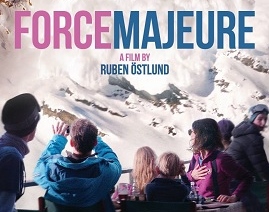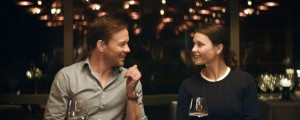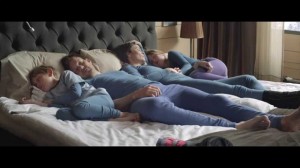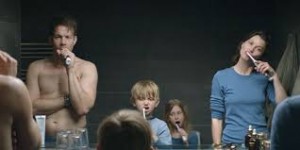WARMTH FROM SNOW
A photogenic family on a skiing holiday makes a terrible discovery during an avalanche, when one of the parents reveals a potentially dangerous lack of character. The kids are traumatized, and the family undergoes a crisis of faith. The shamed one and the frightened partner are counseled if not comforted by friends as they grope the ramifications of their new relationship, post-Tree of Knowledge. If it were an American movie, Force Majeure would likely feature a brooding sobriety of tone; but it is Swedish, and so it can be very funny.
As an argument in favor of Teutonic filmmaking, Force Majeure is especially persuasive. Ruben Östlund has shot his fourth feature with deceptive simplicity and comforting mastery. The cool intimacy of his work with actors reflects Ingmar Bergman – after ten minutes and perhaps thirty lines of dialogue, the viewer sympathizes like a friend who’s known the characters all their lives; well enough to laugh and chide and feel horrified. Östlund has also learned from the Dogme 95 movement that launched Lars von Trier out of Denmark in a hip update of New Wave aesthetics: Östlund tells his story with spartan focus and graceful economy, investing in on-location detail to enrich the big picture.
Östlund’s script allows lots of breathing room, time for characters and audience to weigh and rationalize important events. And the excellent actors, particularly Johannes Kuhnke and Lisa Loven Kongsli as the couple who might not be anymore, are much aided by smart dialogue and a natural, logical progression; as awkward and squirmy as the situations get, the world remains very real and immediate. The essential goodness of humanity is redeemed in even the devastating moments. It’s understandable that the film won the 2014 Jury Prize at Cannes, was nominated for a Golden Globe (Best Foreign Film), and is likely to be nominated for an Oscar in the same category.
There are disappointing choices. A late transgression on the part of the other parent, while thematically appropriate to the story’s gentle arc, clunks into place as a too-exact mirror of the earlier crisis. This lack of creativity in the second event is surprising, given the picture’s overall smarts. But there runs throughout, especially in the last hour, a tendency to start false fires. Shots and circumstances hint strongly of melodrama that never materializes; it’s nice that it never materializes; it’s not very nice that one has to keep hoping it doesn’t. The tonal effect of these unnecessary subversions can be jarring. The movie could do without this commentary that real drama is internal; it also could gain impact by losing twenty minutes’ running time.
Still, gloriously, Force Majeure serves as a glamorous pitch for middle-class Western European life. Fredrik Wenzel photographs the clean monochromatic lines of a French Alpine resort, of expensive clothing, of pure snow and azure sky, of wine glasses, of thoughtful blonde faces, quietly selling a fantasy of reasonable socialist luxury. It’s a fine environment in which to watch pretty people solve problems. Physically and emotionally, this is a lovely and stimulating place.
photos courtesy Magnolia Pictures
Force Majeure
Swedish | 120 minutes
in limited release
screened by American Cinematheque at the Aero Theatre,
as part of its Golden Globe Best Foreign Film Nominees series
for more info, visit www.magpictures.com/forcemajeure




